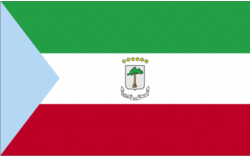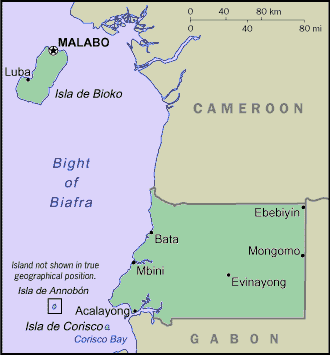Traveling Luck for Equatorial Guinea. Equatorial Guinea, Africa
Equatorial Guinea is located in Western Africa, bordering the Bight of Biafra, between Cameroon and Gabon.
Land in Equatorial Guinea is coastal plains rise to interior hills; islands are volcanic.
Equatorial Guinean or Equatoguinean land covers an area of 28051 square kilometers which is slightly smaller than Maryland
Equatorial Guinea has borders with Cameroon for 189km and Gabon for 350km.
 Equatorial Guinean or Equatoguinean national flag (Flag of Equatorial Guinea)
Equatorial Guinean or Equatoguinean national flag (Flag of Equatorial Guinea)
As for the Equatorial Guinean or Equatoguinean climate; tropical; always hot, humid.
Equatorial Guinean(s) or Equatoguinean(s) speak Spanish (official), French (official), pidgin English, Fang, Bubi, Ibo.
Places of note in Equatorial Guinea
 Equatorial Guinean or Equatoguinean map
Equatorial Guinean or Equatoguinean map
Regions of Equatorial Guinea
Equatorial Guinea gained independence in 1968 after 190 years of Spanish rule. This tiny country, composed of a mainland portion plus five inhabited islands, is one of the smallest on the African continent. President Teodoro OBIANG NGUEMA MBASOGO has ruled the country since 1979 when he seized power in a coup. Although nominally a constitutional democracy since 1991, the 1996 and 2002 presidential elections - as well as the 1999 and 2004 legislative elections - were widely seen as flawed. The president exerts almost total control over the political system and has discouraged political opposition. Equatorial Guinea has experienced rapid economic growth due to the discovery of large offshore oil reserves, and in the last decade has become Sub-Saharan Africa's third largest oil exporter. Despite the country's economic windfall from oil production resulting in a massive increase in government revenue in recent years, there have been few improvements in the population's living standards.
The discovery and exploitation of large oil reserves have contributed to dramatic economic growth in recent years. Forestry, farming, and fishing are also major components of GDP. Subsistence farming predominates. Although pre-independence Equatorial Guinea counted on cocoa production for hard currency earnings, the neglect of the rural economy under successive regimes has diminished potential for agriculture-led growth (the government has stated its intention to reinvest some oil revenue into agriculture). A number of aid programs sponsored by the World Bank and the IMF have been cut off since 1993, because of corruption and mismanagement. No longer eligible for concessional financing because of large oil revenues, the government has been trying to agree on a "shadow" fiscal management program with the World Bank and IMF. Businesses, for the most part, are owned by government officials and their family members. Undeveloped natural resources include titanium, iron ore, manganese, uranium, and alluvial gold. Growth remained strong in 2005, led by oil. Equatorial Guinea now has the second highest per capita income in the world, after Luxembourg.
Equatorial Guinean or Equatoguinean natural resources include petroleum, natural gas, timber, gold, bauxite, diamonds, tantalum, sand and gravel, clay
insular and continental regions widely separated
Equatorial Guinean or Equatoguinean religion is nominally Christian and predominantly Roman Catholic, pagan practices.
Natural hazards in Equatorial Guinea include violent windstorms, flash floods.
Travel Advice for Equatorial Guinea
Equatorial GuineaSUMMARY
- There is no British Embassy in Equatorial Guinea. In an emergency, you can obtain consular assistance through the British Deputy High Commission in Lagos. Please see contact details of this Travel Advice for details.
- If you wish to travel outside Malabo on the island of Bioko, or outside Bata on the mainland, you will need to inform Protocol Division of the Ministry of Foreign Affairs, Cooperation and Francophonie in advance.
- The threat from terrorism is low but you should be aware of the global risk of indiscriminate terrorist attacks, which could be against civilian targets, including places frequented by foreigners.
- We are not aware of any British nationals who have required consular assistance in Equatorial Guinea in the past year but there are regular reports of petty theft.
- You should carry copies of appropriate documentation (passport or residence permit) with you at all times for identification purposes. Failure to produce documents on request can lead to detention.
- We strongly recommend that you obtain comprehensive travel and medical insurance before travelling. You should check any exclusions, and that your policy covers you for the activities you want to undertake. Please see: Travel Insurance
SAFETY AND SECURITY
Compared to other countries in the region, the level of violent crime in Equatorial Guinea is not high. There are regular reports of petty theft affecting both visitors and expatriates. We recommend that you take sensible personal security precautions. You should avoid carrying valuables or wearing jewellery in public and avoid isolated or poorer areas of town. You should not walk around Malabo and Bata at night and should also avoid travelling by road after dark.
Political Situation
Equatorial Guinea Country Profile
Political events can lead to increased presence of police, military or security forces on the streets. This can happen with little or no notice. You should carry copies of appropriate documentation (passport or residence permit) with you at all times. Failure to produce documents on request can lead to detention.
You should avoid any political rallies, demonstrations or large public gatherings.
There have been occasions when expatriate staff of foreign companies have been confined to the country for prolonged periods when commercial disputes have arisen. In such circumstances support from the British Deputy High Commission in Lagos is confined to a consular support role.
Local Travel
If you wish to travel outside Malabo on the island of Bioko, or outside Bata on the mainland, you will need to inform Protocol Division of the Ministry of Foreign Affairs, Cooperation and Francophonie in advance.
Most roads in Malabo are paved. In rural areas the condition of the roads is likely to be poor. During the rainy season, many roads are accessible only with a four-wheel drive vehicle.
Police and military roadblocks are common. You may be asked to show your passport, driving licence or vehicle registration documents and explain your reason for being in the area. Failure to comply with requests can lead to detention.
There are regular reports of extortion by police and uniformed security forces at roadblocks. You are advised not to pay bribes but to ask for a ticket, detailing alleged offences or violations, which can be paid at a local court.
Public transport facilities, particularly on mainland Equatorial Guinea, are extremely limited.
Land borders are often closed with little or no notice. They are currently reported to be open. We recommend that you check the situation with the local authorities before travelling.
Air Safety
The EU has published a list of air carriers that are subject to an operating ban or restrictions within the community. You should check the following link to see whether this will affect your travel: http://europa.eu.int/comm/transport/air/safety/flywell_en.htm
All but one of Equatorial Guinea's airlines have been grounded since 29 May 2006, when the Ministry of Transport cancelled their operating licences after a general aircraft inspection revealed that International Civil Aviation Organisation (ICAO) standards were not met.
An overloaded Air Equateur plane from Malabo to Bata crashed in July 2005, killing all 60 passengers on board. All national and regional passenger flights on Soviet built Antonov and Yak planes have since been suspended.
Equato-Guinean-registered aircraft are banned from British airspace on safety grounds, and British Government employees do not use flights run by Equato-Guinean airline companies unless this is unavoidable. You should bear this in mind when making your travel plans.
LOCAL LAWS AND CUSTOMS
ENTRY REQUIREMENTS
You are strongly advised to check that your passports are properly endorsed/stamped at the airport, on arrival and departure, before leaving the immigration desk. There have been reports of travellers being delayed or threatened with detention because their passports have not been properly endorsed/stamped.
If you have recently acquired a new travel document you should ensure that you transfer your visa for Equatorial Guinea to your new passport before travelling. The Equatorial Guinean authorities will not admit travellers on visas entered into old passports, even if the visa is still valid.
You may be asked to produce a yellow fever vaccination certificate on arrival in the country. Failure to do so may result in a further vaccination being administered, for which a charge is made.
Single parents or other adults travelling alone with children should be aware that some countries require documentary evidence of parental responsibility before allowing lone parents to enter the country or, in some cases, before permitting the children to leave the country. For further information on exactly what will be required at immigration please contact the Equatorial Guinean representation in the UK.
HEALTH
GENERAL

 Search
Search Equatorial Guinea country profile
Equatorial Guinea country profile Travel advice for Equatorial Guinea
Travel advice for Equatorial Guinea